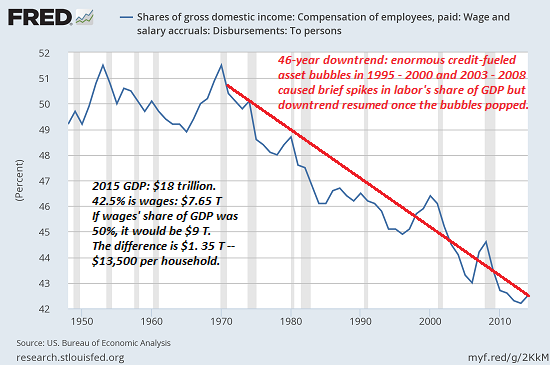"The $15 minimum wage will come out of the hides of working people eating lunch or running errands after work."
For many, the most direct way of increasing the income of low-wage workers is to raise the minimum wage significantly. Many high-cost states have already passed legislation to raise the minimum wage to $15/hour.
Despite the official claims that inflation is near-zero, low-income workers have been pinched by stagnant wages and higher costs. Longer term, wages as a share of the nation's GDP have been declining for decades (see chart below).
But this well-intentioned program has unintended consequences, not just for those it intends to help but for the economy as a whole. Long-time correspondent J.M. recently shared some incisive analysis of the many less-than-positive consequences of much higher minimum wages.
In this context, it's useful to revisit Smith's Law of Conservation of Risk: Every sustained action has more than one consequence. Some consequences will appear positive for a time before revealing their destructive nature. Some consequences will be intended, some will not. Some will be foreseeable, some will not. Some will be controllable, some will not. Those that are unforeseen and uncontrollable will trigger waves of other unforeseen and uncontrollable consequences. (July 8, 2014)
Here is J.M.'s thought-provoking commentary:
Please bear with me, I am still playing with these ideas on the consequences of a $15/hour minimum wage:
Europe:
We, rather snarkily, look down our noses at the European habit of the 90-minute lunch.
What if the 90-minute lunch were a necessity, given the staffing levels, and not a cultural affectation? Suppose labor cost $20/hour (with benefits) and there were only two people working in the restaurant...a husband/wife team. Would it be even possible to be served within time standards that we, in the United States, currently consider to be the barest minimum levels of service?
Politicians LOVE giving gifts that they do not need to pay for. They can feel extremely generous. That is why raising the minimum wage is so appealing to them. They think it is "free".
But in the case of the 90 minute lunch...who pays? Who takes the hit to their quality-of-life? Not the "rich" business owners.
Walmart:
I was standing in line at Walmart the other day. As a retiree, a fifteen minute wait is tedious but not a big deal.
A young African-American gent in a highly reflective shirt (i.e. a man on his lunch break from construction/road work) stood at the far end of the line. He had a small container of popcorn chicken, some chips and a soft drink. I asked if he was on his lunch break from work. He said that he was. To the credit of every person standing in that check-out line (seven of us), we moved him up to the front of the line and out the door. He did not need to spend half of his lunch break (assuming a thirty minute break) standing in line.
That degree of generosity might be the exception. That man was lucky.
The magnificent "gift" that we are inexorably marching toward, the $15 minimum wage, will come out of the hides of working people eating lunch or running errands after work.
Not only will the transaction price of a sandwich rise, so will the opportunity costs.To date, I have seen much ink spilled regarding the transaction price but almost nothing about the inevitable opportunity costs. De-staffing will gut throughput of support services and impair "high value" enterprises.
The fast food lunch that formerly cost $7 and 4 minutes will cost $10 and 15 or 30 minutes. At $15/hour, an additional 26 minutes adds $6.50 to the real cost of that meal.
A secondary effect will be that doctor's, dentist's, lawyer's, accountant's (etc.) offices will have 90-minute mid-day downtimes instead of 30 minute downtimes. People needing professional services will be pushed off. Some people will defer seeking help for that tingling in their left arm or that suddenly severe "indigestion".
A relatively small portion of the population makes the minimum wage. The cost to society for a highly skilled, and highly compensated, person is much, much higher than the minimum wage. And it does not need to be the thoracic surgeon who is tangled up, waiting in line. It can be the second nurse to the anesthesiologist. A lack of any one of the team will negatively impact their productivity.
Businesses are already transitioning on the expectation of $15/hour. They are figuring out how to run with fewer people.
In some cases, reducing people means dropping to a single person. That poses a risk to stand-alone businesses that accept cash. One reasonable expectation is that small businesses will only accept credit/debit cards during their slow periods and when risks of armed robberies are high.
The ripples travel far and the consequences injure the very people who politicians visualize helping.
Thank you, J.M., for sharing your commentary on the unintended consequences of $15/hour minimum wage. Many analysts favor expanding the Earned Income Tax Credit (EITC) to boost the wages of low-income workers rather than raising minimum wages. In effect, the EITC raises the net income of low-income workers without passing on higher costs throughout the economy.
NOTE: Contributions/subscriptions are acknowledged in the order received. Your name and email remain confidential and will not be given to any other individual, company or agency.
|
Thank you, Timothy S. ($5/month), for your stupendously generous re-subscription to this site-- I am greatly honored by your support and readership.
| |




























